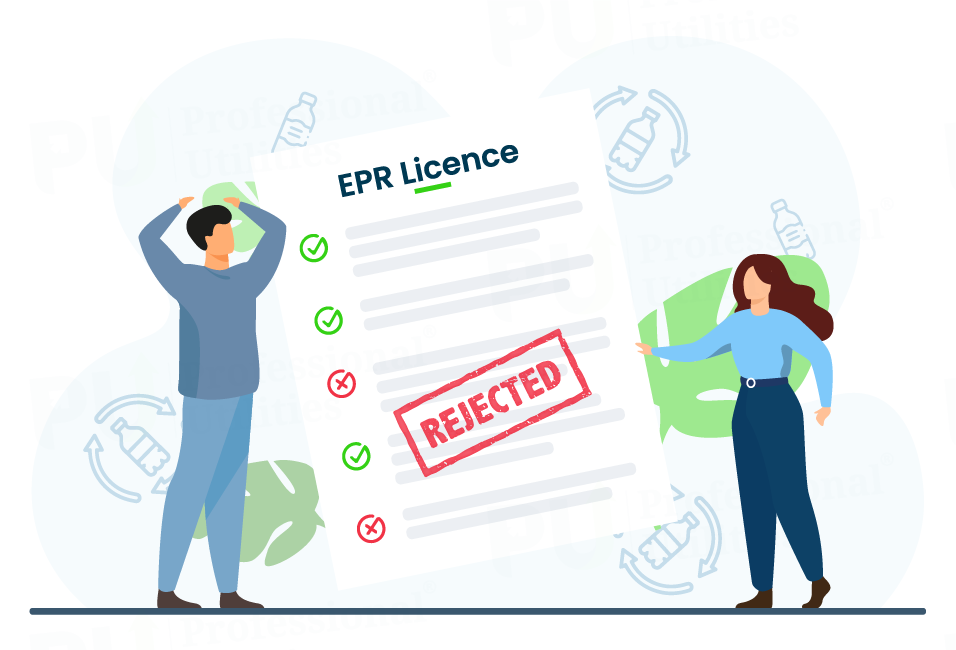
Updated on January 18, 2025 01:02:01 PM
Online EPR Registration for plastic packaging is a process of getting authorization from the Central pollution control board for plastic waste management. The objective of EPR is to manage plastic waste generated by PIBOs at pre-consumer and post-consumer stages. It is the responsibility of producers, importers and brand owners (PIBOs) to recycle, re-use & dispose of it. The CPCB EPR plastic authorization is granted to concerned PIBOs to regulate their waste generation and meet EPR targets annually.
To achieve their plastic EPR obligations annually the PIBOs (Producer, importer and brand owners) are required to file their online application with Central pollution control board or state pollution control board respectively. The Authorization is granted to PIBOs after through verification of audit of road map layed out by PIBOs to dispose of plastic waste generated by them.
Professional Utilities can help you get EPR authorization for plastic & its associate products in a smooth and effortless manner, just fill out the contact Form.
EPR Registration For Plastic Packaging
| EPR Registration for plastic packaging | Details |
|---|---|
| Time taken to get EPR Certificate for plastic | 25 - 30 days |
| EPR Registration fees for Plastic(Govt.) |
Plastic waste generation in (TPA)
|
| Renewal and Validity for plastic epr authorization | New EPR registration is valid for 1 year and renewed certificate will be valid for upto 3 years |
| Renewal Fee for CPCB EPR registration for plastic | The renewal fee for EPR registration is same as application fee |
| Cost for filing EPR annual Returns(Govt) | 25% of initial EPR authorization fees |
| Mode of Application for EPR Registration | Online Application |

EPR registration refers to the process through which importers, producers & brand owners of plastic packaging & goods get authorization to implement EPR regulations set by the CPCB/SPCPs. It involves the formal EPR registration of an entity as a responsible PIBOs, indicating their commitment to managing and reducing the environmental impact of their products throughout its life cycle.

Under the guidelines for EPR, the eligibility for EPR registration for plastic waste classified among three entities called PIBOs
Any entity that falls into above mentioned criteria are eligible to get EPR registration for plastic except micro and small MSMEs.

Plastics are categorized into four categories by the central pollution control board of India. Any entity engaging in importing or producing any of these are required to have EPR certification for plastic waste generation.
NOTE:- If waste plastic is utilized in road construction, applicants are required to produce a self-declaration certificate using the proforma created by the Central Pollution Control Board (CPCB).

The registration for Extended Producer Responsibility (EPR) plays a vital role in nurturing sustainable waste management practices. It incentivizes businesses to take responsibility for their products, specifically their plastic packaging and post-consumer waste. By enrolling in EPR, businesses showcase their dedication to environmental sustainability, thereby enhancing their reputation among consumers, investors, and regulatory bodies.

Note:- In case PIBOs qualify as both brand owner, producer & importers of plastic respectively then it is obligatory for them to get separate CPCB registration in those respective categories.

The fees for EPR registration for plastic is categorized on the basis of waste generated by PIBOs per annum.
| Plastic Waste Generated in TPA | EPR Registration fees(Govt) |
|---|---|
| ✅ Less than 1000 | ₹10,000 |
| ✅ Between 1000-10000 | ₹20,000 |
| ✅ More than 10000 | ₹50,000 |

EPR Registration process for getting authorisation from CPCB as an PIBO of plastic products are classified under four parts.
Step 1:
General information
Step 2:
Details of effluent
Step 3:
Waste generation details
Step 4:
Action plan for implementation of EPR
Applicants are required to provide above mentioned details as well as required documents as per the guidelines of plastic waste management for PIBOs.
Note: Once the application is successfully filled with CPCB or respective SPCP/PCCs. It will take around 15 days for authorities to commence it.

Once the Applicant has successfully registered themselves with CPCB/SPCBs. They are required to implement an EPR action plan to meet their EPR target for the given year.
As per the guidelines, PIBOs are required to meet their EPR obligations by ensuring that plastic waste is processed through EPR authorized "plastic waste processors". Importers must obtain certificates from PWPs (Plastic waste processors) as per the quantity of waste processed by PWPs.



The EPR certification for plastic can be canceled by their respective authorities on the basis of the following:-


At Professional Utilities, we leverage our industry knowledge and expertise to help businesses navigate complex regulations, minimize risks, and optimize operations for maximum efficiency and profitability.






The annual EPR target for producers, importers and brand owners is decided during the time of their registration with CPCB/SPCBs on the basis of plastic waste generated by them.
The fee for EPR registration for PIBOs varies as per the quantity of plastic waste accumulated during pre-consumer and post consumer uses.
| Plastic Waste Generated in TPA | Fees for EPR Registration for plastic(Govt) |
|---|---|
| Less than 1000 | ₹10,000 |
| Between 1000-10000 | ₹20,000 |
| More than 10000 | ₹50,000 |
Micro and small MSMES are exempted from getting an CPCB EPR registration and are not required to meet EPR targets. However it is also a social responsibility to keep plastic waste generation at minimum for a better future and environment.
PIBOs are eligible to acquire EPR certification.
PIBOs is an acronym for:-
Speak Directly to our Expert Today

Reliable

Affordable

Assured